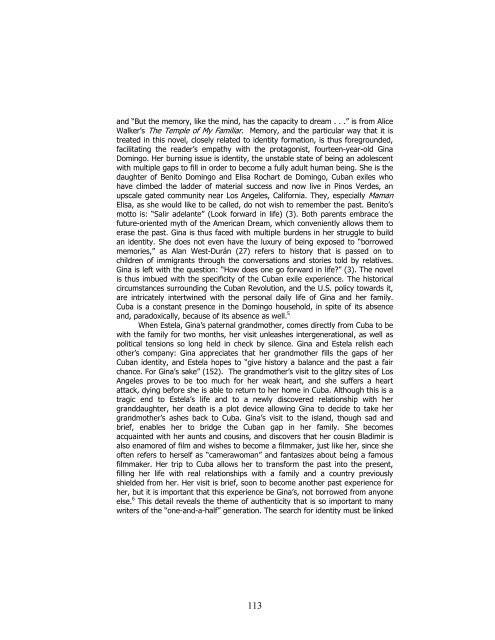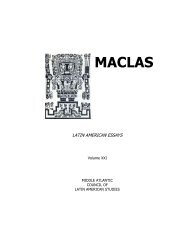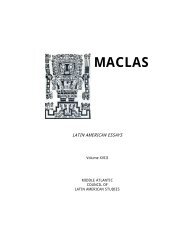latin american essays maclas
latin american essays maclas
latin american essays maclas
Create successful ePaper yourself
Turn your PDF publications into a flip-book with our unique Google optimized e-Paper software.
and “But the memory, like the mind, has the capacity to dream . . .” is from Alice<br />
Walker’s The Temple of My Familiar. Memory, and the particular way that it is<br />
treated in this novel, closely related to identity formation, is thus foregrounded,<br />
facilitating the reader’s empathy with the protagonist, fourteen-year-old Gina<br />
Domingo. Her burning issue is identity, the unstable state of being an adolescent<br />
with multiple gaps to fill in order to become a fully adult human being. She is the<br />
daughter of Benito Domingo and Elisa Rochart de Domingo, Cuban exiles who<br />
have climbed the ladder of material success and now live in Pinos Verdes, an<br />
upscale gated community near Los Angeles, California. They, especially Maman<br />
Elisa, as she would like to be called, do not wish to remember the past. Benito’s<br />
motto is: “Salir adelante” (Look forward in life) (3). Both parents embrace the<br />
future-oriented myth of the American Dream, which conveniently allows them to<br />
erase the past. Gina is thus faced with multiple burdens in her struggle to build<br />
an identity. She does not even have the luxury of being exposed to “borrowed<br />
memories,” as Alan West-Durán (27) refers to history that is passed on to<br />
children of immigrants through the conversations and stories told by relatives.<br />
Gina is left with the question: “How does one go forward in life” (3). The novel<br />
is thus imbued with the specificity of the Cuban exile experience. The historical<br />
circumstances surrounding the Cuban Revolution, and the U.S. policy towards it,<br />
are intricately intertwined with the personal daily life of Gina and her family.<br />
Cuba is a constant presence in the Domingo household, in spite of its absence<br />
and, paradoxically, because of its absence as well. 5<br />
When Estela, Gina’s paternal grandmother, comes directly from Cuba to be<br />
with the family for two months, her visit unleashes intergenerational, as well as<br />
political tensions so long held in check by silence. Gina and Estela relish each<br />
other’s company: Gina appreciates that her grandmother fills the gaps of her<br />
Cuban identity, and Estela hopes to “give history a balance and the past a fair<br />
chance. For Gina’s sake” (152). The grandmother’s visit to the glitzy sites of Los<br />
Angeles proves to be too much for her weak heart, and she suffers a heart<br />
attack, dying before she is able to return to her home in Cuba. Although this is a<br />
tragic end to Estela’s life and to a newly discovered relationship with her<br />
granddaughter, her death is a plot device allowing Gina to decide to take her<br />
grandmother’s ashes back to Cuba. Gina’s visit to the island, though sad and<br />
brief, enables her to bridge the Cuban gap in her family. She becomes<br />
acquainted with her aunts and cousins, and discovers that her cousin Bladimir is<br />
also enamored of film and wishes to become a filmmaker, just like her, since she<br />
often refers to herself as “camerawoman” and fantasizes about being a famous<br />
filmmaker. Her trip to Cuba allows her to transform the past into the present,<br />
filling her life with real relationships with a family and a country previously<br />
shielded from her. Her visit is brief, soon to become another past experience for<br />
her, but it is important that this experience be Gina’s, not borrowed from anyone<br />
else. 6 This detail reveals the theme of authenticity that is so important to many<br />
writers of the “one-and-a-half” generation. The search for identity must be linked<br />
113




